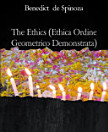Ethics
May 2022 · Otbebookpublishing
Ebook
159
Pages
family_home
Eligible
info
reportRatings and reviews aren’t verified Learn More
About this ebook
This is the fundamental principle of the Ethics: Spinoza holds that everything that exists is part of nature, and everything in nature follows the same basic laws. In this perspective, human beings are part of nature, and hence they can be explained and understood in the same way as everything else in nature.
About the author
Benedictus de Spinoza, born in 1632 in Amsterdam to a Portuguese-Jewish family, stands as one of the most radical and influential philosophers of the Enlightenment. His life was marked by controversy and intellectual bravery. Excommunicated from the Jewish community at the age of 23 for his unorthodox views, Spinoza lived a life of modest means, supporting himself as a lens grinder while developing his groundbreaking philosophical ideas.Spinoza's work challenged the very foundations of religious and political thought. He argued for a pantheistic view of God, seeing divinity in everything and rejecting the notion of a personal, anthropomorphic deity. This revolutionary idea positioned him as a precursor to modern secularism and rationalism, influencing thinkers like Goethe, Hegel, and Einstein.His insistence on the importance of reason, freedom of thought, and the pursuit of intellectual and ethical self-improvement resonated deeply with the values of the Enlightenment. Spinoza's ideas on democracy, the nature of the human mind, and the interconnection of all things continue to inspire contemporary debates in philosophy, science, and politics.Despite facing ostracism and living a life of relative obscurity, Spinoza's intellectual legacy endures, inviting modern readers to explore the profound depths of his thought and its enduring relevance in a world still grappling with questions of faith, reason, and human freedom.
Rate this ebook
Tell us what you think.
Reading information
Smartphones and tablets
Install the Google Play Books app for Android and iPad/iPhone. It syncs automatically with your account and allows you to read online or offline wherever you are.
Laptops and computers
You can listen to audiobooks purchased on Google Play using your computer's web browser.
eReaders and other devices
To read on e-ink devices like Kobo eReaders, you'll need to download a file and transfer it to your device. Follow the detailed Help Center instructions to transfer the files to supported eReaders.








